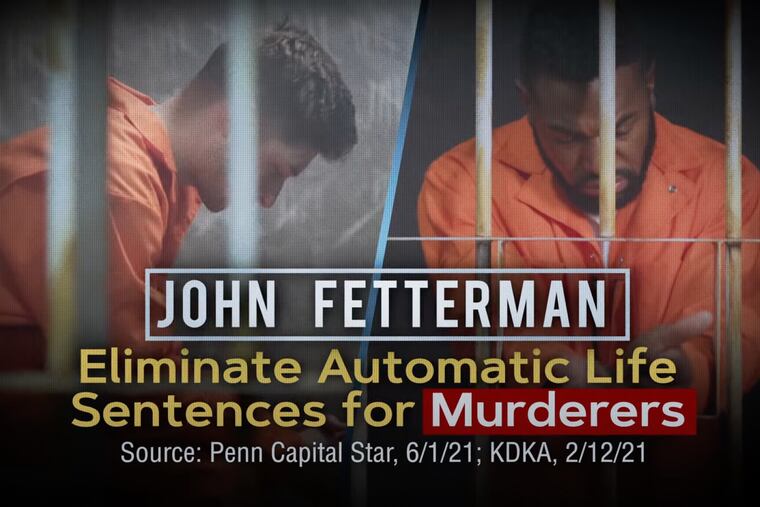I know the ‘murderers’ from Oz’s ads. They are no menace to society.
These men, released from their life sentences, are making the most of their second chance. I believe they could do far more than any politician to improve public safety in our city.

As I watched the Phillies clinch the National League pennant on Oct. 23, every once in a while a hush fell over the room. It wasn’t when Rhys Hoskins went deep to take the lead or when Bryce Harper homered late and the whole city went nuts. The people I was with grew quiet when the political ads came on, the ones about crime and “murderers” that most of us have seen over and over. Because among those in that room with me were many of those “murderers” who Mehmet Oz is using to stoke fear and bolster his political campaign.
We were gathered in a room on the St. Joseph’s University campus, where I am a professor. There was John, Felix, Sam (known affectionately as “Muscles”), Terell (we call him “Rell”), Dennis, and David (“Wavy” to everyone there). Others in the room on that glorious Sunday were friends, partners, and spouses bonding over turkey sandwiches, homemade chili, and an improbable pennant run. Between innings, we talked about the Eagles and Thanksgiving plans.
“I am fortunate to count them among my friends.”
I met most of these men when they were still inside prison. They were part of a group of lifers who talked with me and my students as part of a class I teach called “Crime, Media, and Justice.” We talked about how media narratives, like political ads, shape the public’s perception of prisons and the people inside them.
These men spent most of their adult lives in prison — 20, 30, and even 40 years — and are among the tiny fraction of people convicted of homicide in Pennsylvania who ever leave prison. In his TV ad, Oz makes it sound as if Fetterman and other reform-minded folks have thrown open the prison doors. Far from it.
The vast majority of the more than 5,000 people imprisoned for homicide in Pennsylvania will die there. In 2022 so far, only seven of those sentences have been shortened.
Unlike in most other states, where parole and clemency are common, in Pennsylvania, “life” means “death by incarceration.” That includes men and women charged with “felony murder,” one of the talking points in Republican ads.
If someone is charged with felony murder, a concept basically unheard of outside the United States, it typically means that person was not directly responsible for the death. Maybe they were a getaway driver or a lookout and someone died during the crime. That’s a life sentence in Pennsylvania.
They are men like Tyreem Rivers, who tried to take the pocketbook of an elderly woman in 1996. He didn’t hit her, but she fell during the robbery and died in the hospital two weeks later. Rivers has been in prison for her murder for the past 26 years.
The men cheering on the Phillies in that room with me last week spent decades in self-reflection, improvement, and remorse to earn a shot at redemption through the commutation lottery. Commutation is the lengthy and intense review of an incarcerated person’s record that includes interviews and evaluations by psychiatrists, prison experts, and others that culminates — for those select few — in a vote by the Board of Pardons.
For the past few years, that board has been chaired by lieutenant governor and U.S. Senate candidate John Fetterman. He is one vote of five on the board, which also includes Attorney General (and gubernatorial candidate) Josh Shapiro, a penal expert, a mental health expert, and a representative of victims. All five have to vote yes for someone with a life sentence to get a chance at commutation, which is ultimately approved by the governor.
» READ MORE: A Pa. mandatory life-without-parole sentence is a flash point between Oz and Fetterman
The men in that room were all released from their life sentences and are making the most of their second chance. Felix mentors young people caught up in the criminal justice system. John is helping other men and women coming home from prison. Others have started businesses. Most, though, are holding down less glamorous jobs. They may be sweeping the floor at your supermarket or mowing the grass at your park.
These men and women are not menaces to society. They are working to make it better. Because they have the authority of lived experiences, young people listen to them. One of my students told me that talking with Felix had “changed how I see the world,” by showing him that what the world says about people like Felix often isn’t true.
Their words and deeds — unlike the stale, tough-on-crime political rhetoric — matter. I believe that these neighbors of ours could do far more than any politician to improve public safety in Philadelphia.
I am fortunate to count them among my friends. And we are fortunate to have them in our community.
J. Michael Lyons is an associate professor and chair of the department of communication and media studies at St. Joseph’s University.